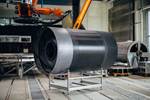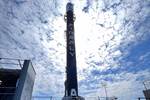Beyond Gravity announces first four startups for Launchpad program
Eight-week incubator program enables the development and commercialization of advanced space solutions for aspiring entrepreneurs and companies, with second round underway.
Startup companies chosen for the first round of Launchpad. Photo Credit: Beyond Gravity
Since the announcement of its internal incubator startup program “Launchpad,” (formerly RUAG Space, Zürich, Switzerland), has accepted four nominated startups. Together, over the next eight weeks, the companies will develop solutions for the future of the space industry, conceptualizing different use cases and test new approaches for artificial intelligence (AI), augmented reality (AR) and innovative propulsion systems for satellites.
According to André Wall, CEO of Beyond Gravity, “I am excited about the ideas of the startups and equally excited about which innovative ideas we can develop and implement together.”
The four startups selected include:
- (Zürich, Switzerland) helps users to set up a working AI model in a short time by means of a data-centric AI platform. Modulos reduced the workload for labeling and cleaning data, which is still said to be high today. Beyond Gravity is interested in collaboration in the area of product quality prediction and optimization.
- (Karlsruhe, Baden-Wurttemberg, Germany) supports model-based engineering of hardware and systems by building a digital platform or digital twin. With the help of AI, early testing can take place based on existing CAD or 3D models. Beyond Gravity sees potential throughout the testing space products.
- (Zürich, Switzerland) develops applications in the field of AR. These solutions are used to execute defined technical processes faster and more precisely. Beyond Gravity sees potential in the space sector in general, where many processes must be clearly defined and executed step by step.
- (Wien, Austria) offers a chemical propulsion system for satellites with a patented injection technology. This enables highly efficient thruster configurations, maneuvers and spacecraft stabilization. As a global supplier of components for satellites, Beyond Gravity sees potential in the collaboration.
Over the next eight weeks, the four teams will be accompanied by external and internal experts as well as members of top management. “Our goal is to work with the startups to conceptualize use cases internally and learn from each other,” Lukas Gnilka, Launchpad program manager, explains. At the end of the incubation phase, a demo day is held to present use cases and discuss further collaboration or possible partnerships internally.
Related Content
-
Call for abstracts: CW Tech Days to explore high-temperature composite solutions
The fall 2025 installment of CW’s Tech Days online event series will cover high-temperature composite solutions for defense and space applications.
-
Automated robotic NDT enhances capabilities for composites
Kineco Kaman Composites India uses a bespoke Fill Accubot ultrasonic testing system to boost inspection efficiency and productivity.
-
Post Cure: Parallel winding technique demonstrates CFRP anisogrid design optimization
Over the years, CIRA has demonstrated its patented CFRP parallel winding technique in a variety of ways for space applications. The lattice structure for the Vega-C launcher stage is a prime example.



